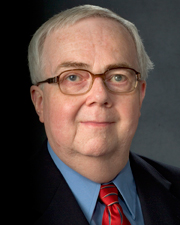Scholarship fund honors former Medicinal Chemistry professor
Please note: Dr. Grunewald passed away Feb. 20, 2023. His obituary is available online.
Gary Grunewald, who spent 50 years on the faculty of the University of Kansas School of Pharmacy, is making a $1.6 million contribution to establish a scholarship fund for pharmacy students at KU. The endowed scholarship will fund two full-tuition scholarships each year for students in the school.
 “Dr. Grunewald’s philanthropy is a remarkable legacy and a tribute to his lifelong passion for science and teaching,” said Dean Ronald Ragan. “He spent his entire post-graduate career in the KU School of Pharmacy, and his impact on students over five decades is immeasurable. He taught and mentored many graduate students who continue to make a difference in the pharmacy community around the world. With this generous gift, his influence on students, the School of Pharmacy and the university will continue to be felt for decades to come.”
“Dr. Grunewald’s philanthropy is a remarkable legacy and a tribute to his lifelong passion for science and teaching,” said Dean Ronald Ragan. “He spent his entire post-graduate career in the KU School of Pharmacy, and his impact on students over five decades is immeasurable. He taught and mentored many graduate students who continue to make a difference in the pharmacy community around the world. With this generous gift, his influence on students, the School of Pharmacy and the university will continue to be felt for decades to come.”
Grunewald’s career was marked not only by 50 years of teaching in the School of Pharmacy, but for his devotion to students. As a mentor and Ph.D. advisor, he helped launch the careers of more than 40 graduate students in medicinal chemistry and scores of others who were under his guidance as post-doctoral scholars.
Grunewald, who turned 85 in November, came to KU in 1966 as an assistant professor in the Department of Medicinal Chemistry, after finishing a Ph.D. in physical organic chemistry at the University of Wisconsin. Previously, he graduated with highest honors and as valedictorian of his 1960 class at Washington State University where he earned two bachelor’s degrees in chemistry and pharmacy. He was selected outstanding graduate in both programs.
Granted full professorship in 1972, Grunewald served as department chair in Medicinal Chemistry from 1994-2003. He was also acting dean of the school in 1993-94. His retirement was celebrated in 2016.
Grunewald earned School of Pharmacy and university teaching awards and was a valued member of the academic and professional community through active committee service and leadership. He was an extraordinary researcher as well, awarded more than 10 National Institutes of Health research grants in addition to funding awards from the American Heart Association, the Department of Defense, and university grants. His research focused on drug design, using computer modeling and nuclear magnetic resonance techniques. Grunewald published over 100 peer reviewed articles and presented his work countless times at meetings and symposia.